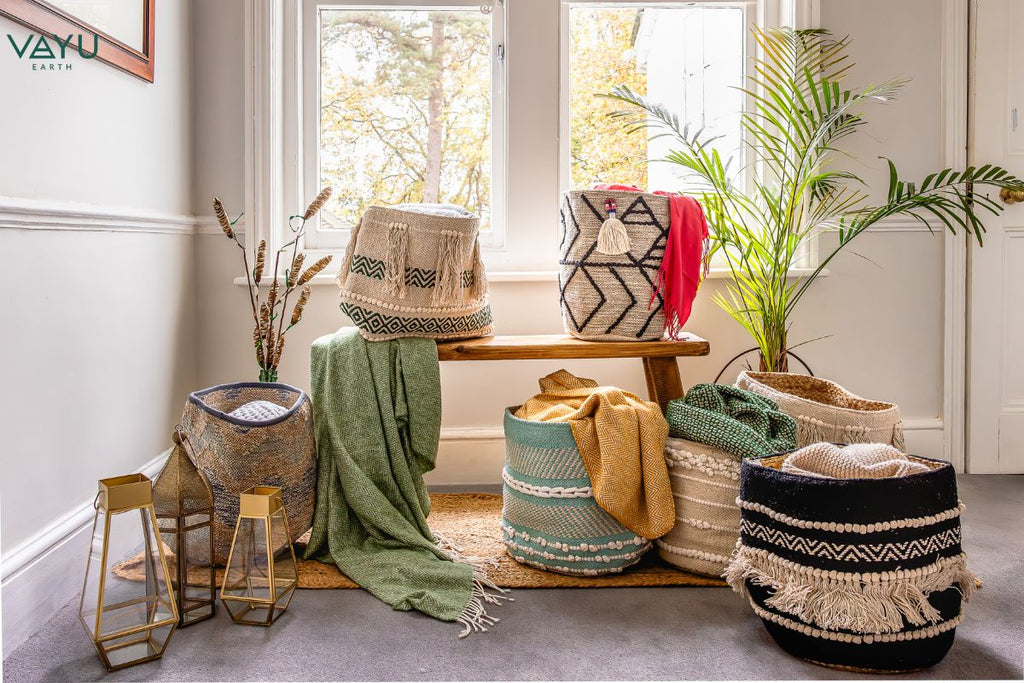Why Now? The New Urgency for Fair Trade in Home Textiles and Décor

The demand for Fair Trade certified home textiles and ethically sourced decorative items is soaring. According to industry forecasts, sustainable and ethically produced décor categories—think cushions, throws, rugs, and artisan-crafted accessories—are driving the market forward, resonating with a generation of eco-conscious, socially responsible consumers. But what’s behind this sudden, urgent focus?

Several interwoven trends have converged:
-
Rising consumer interest in transparency, traceability, and authenticity
-
The mainstreaming of sustainability: “eco-friendly” is now a purchasing priority, not a niche
-
A desire to support marginalised communities and protect traditional crafts
-
Personal wellbeing: people find comfort and purpose in surrounding themselves with meaningful, story-rich items
Let’s explore why Fair Trade in home décor matters—and how it translates into cushions you can plump up proudly, a throw you cherish on a chilly day, and a rug that weaves a tale of dignity and heritage into your living space.
1. Fair Trade Certified Home Textiles: Cushions, Throws & Rugs

Fair Trade certified home textiles—cushions, throws, and rugs—have transformed from basic household staples into emblems of ethical living. When you touch a hand-loomed cushion or drape a Fair Trade certified throw over your sofa, you’re connecting your everyday comfort to a much bigger picture.
What makes these textiles different?
-
Transparent supply chains: Every step, from sourcing the cotton or wool to the spinning, dyeing, and weaving process, is tracked to ensure ethical practices.
-
Fair pay and safe conditions: The artisans, often women and members of marginalised communities, receive fair wages and work in supportive, democratically-run workshops.
-
Sustainable materials: Organic cotton, natural dyes, and ethically sourced wool take centre stage—good for your home and the planet.
-
Cultural preservation: Traditional weaving techniques are kept alive, sustaining heritage skills and creating a tangible link between past and present.
In 2025, the swift growth in demand for these products is not just about “going green”—it’s about creating a sanctuary filled with comfort, conscience, and craft.
2. Hand-Beaded Décor and Baskets Supporting Women’s Cooperatives

It’s impossible to discuss Fair Trade in home décor without celebrating women’s empowerment. Hand-beaded baskets, wall hangings, and shimmering ornaments do not just decorate a room; they tell a story of resilience and hope.
-
Women’s cooperatives: Across the globe, Fair Trade practices support collectives where women work collaboratively, gain financial independence, and access education and healthcare.
-
Exquisite artistry: Every bead is carefully placed by hand, and every basket is woven with inherited technique and creativity.
-
Purpose-driven choice: When you choose a hand-beaded décor piece, you invest directly in women’s futures and the flourishing of entire communities.
These accessories have become both a style statement and an ethical choice—proof positive that supporting Fair Trade certified decor means uplifting lives and keeping culture alive.
3. Ethically Sourced Wool Rugs & Hand-Loomed Carpets

A rug is the heart of any room, anchoring both its design and energy. But rugs and carpets have too often been associated with exploitative labour and environmental harm. Fair Trade certified wool rugs and hand-loomed carpets offer a radical alternative.
-
Ethical sourcing: The wool itself is traced to responsible farms where animals are treated with care and land is managed sustainably.
-
Traditional skills: Hand-looming provides dignified employment and keeps time-intensive, heritage weaving methods thriving.
-
Healthier homes: Natural, non-toxic dyes mean no harsh chemicals underfoot, making these pieces safer for families and pets.
With each ethically sourced rug, you can trace the forgotten journey “from artisan-to-home”, transforming what’s beneath your feet into a symbol of slow, conscious living.
4. Artisan Pottery: Every Piece Tagged with a Maker’s Story

In a world filled with mass-produced anonymity, artisan pottery has surged in popularity as a symbol of returning to the personal and the real. Every Fair Trade ceramic bowl, vase, or mug is accompanied by a tag—often handwritten—which shares the story, name, or even a photograph of its maker.
-
Emotional connection: Each handle, curve, and glaze is shaped by hand, carrying visible marks of its creator’s care and tradition.
-
Supporting livelihoods: For many ceramists, Fair Trade partnerships provide access to global markets, enabling them to grow their studios and pass their skills to the next generation.
-
Authenticity and soul: Displaying such pottery at home signals not only taste, but values—a celebration of skill, patience, and personality.
5. Decor With a Story: Traceability “From Artisan-to-Home”
Labelling is no longer an afterthought; it’s a powerful narrative. Fair Trade certified decor now frequently arrives with detailed stories and photographs, inviting customers directly into the process.
-
QR codes and artisan bios: Scan a label and discover the hands, places, and traditions woven into your rug or etched onto your pottery.
-
Conscious curation: This transparency builds trust and meaning, transforming everyday items into heirlooms that can be spoken about and cherished.
Why It Matters More Than Ever in 2025

Today’s home décor landscape is dominated by a new ideal: style with substance. In the relentless pursuit of not just beautiful spaces, but better spaces, Fair Trade offers a blueprint for interiors that are ethically, ecologically, and emotionally rich.
-
Sustainability is at the heart of décor decisions; what once set you apart now allows you to belong to a global movement for positive change.
-
Artisan voices are amplified—supporting not only fair income but cultural survival and innovation.
-
Transparency reshapes trust—as buyers increasingly demand to know who, where, and how their décor is made.
The future of ethical decorating is now; it is woven into the Fair Trade cushion you lean against, the hand-beaded basket that organises your space, the artisan pottery mug you sip from, and the rug that invites you to slow down and feel connected.
In Summary
Fair Trade is not a trend: it’s a reckoning, a return to respecting makers and materials, empowering buyers to choose not just with their eyes, but with their hearts. When you bring Fair Trade certified home textiles, hand-beaded décor, or a potter’s lovingly made bowl into your home, you are making a decision that matters more than ever—for people, for planet, and for the stories that make each space unique.





